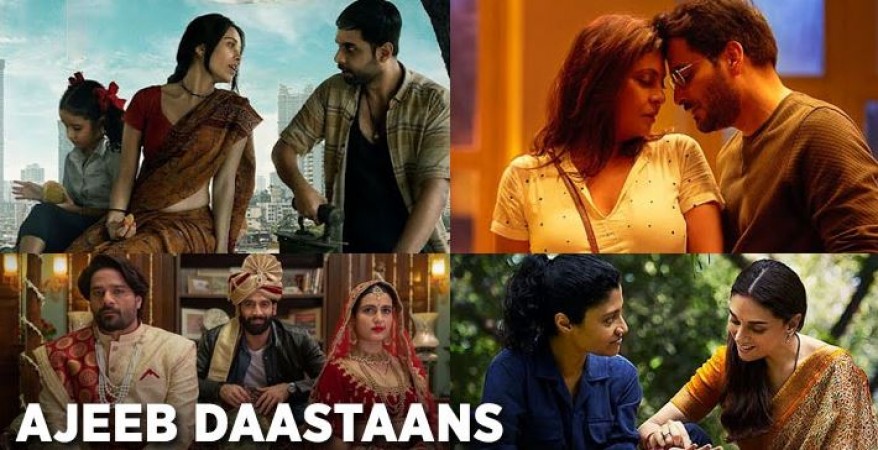
The development of new talent and perspectives is crucial for the industry's progress in the constantly changing field of Indian cinema. After making his feature film debut, actor turned director Kayoze Irani made a big impression in the anthology film "Ajeeb Daastaans." The film, which delves into the intricacies of human relationships, was released on Netflix in April 2021. In it, Kayoze Irani's segment, "Ankahi," demonstrates his remarkable storytelling abilities. This article explores the career path of director Kayoze Irani, the importance of "Ajeeb Daastaans" in Indian cinema, and the results of his feature film debut.
Kayoze Irani was raised in a family with strong ties to the Indian film business. His father, Bollywood actor Boman Irani, is well-known for his ability to play a variety of roles in both dramatic and comedic movies. With such a distinguished past, Kayoze Irani had some very big shoes to fill. He did, however, decide to forge his own route in the business by pursuing his passions for acting and filmmaking.
Irani made his screen debut in the 2012 movie "Student of the Year," which marked the beginning of his career in the film industry. He worked on several projects over the years, developing his abilities and accumulating experience. His heart was obviously behind the camera as well as in front of it. His aspirations to become a director began with this realisation.
The Indian anthology film genre has gained a noteworthy addition with "Ajeeb Daastaans". In recent years, anthology films have become more and more popular because they provide a distinctive format for telling several stories in a single cinematic experience. "Ajeeb Daastaans" is noteworthy because it delves into unorthodox and frequently disregarded facets of interpersonal relationships and presents unique stories in each of its parts.
There are four stories in the movie, each directed by a separate director. It brought together a group of gifted actors and filmmakers to work together on a project that subverted traditional storytelling conventions. "Majnu," directed by Shashank Khaitan, "Khilauna," directed by Raj Mehta, "Geeli Pucchi," directed by Neeraj Ghaywan, and "Ankahi," directed by Kayoze Irani, are the four stories included in the anthology.
The fact that "Ankahi" marks Kayoze Irani's directorial debut speaks volumes about his vision and storytelling skills. The segment centres on the lives of two characters, Natasha (Shefali Shah) and Kabir (Manav Kaul), and tells an unusual but endearing story. The story examines the difficulties and nuances of communication in families, especially between a mother and her deaf and silent son.
The strength of "Ankahi" resides in its capacity to capture the suppressed feelings and subtle facial expressions that characterise Natasha and Kabir's relationship. A masterclass in emotive acting is Shefali Shah's portrayal of a mother who finds it difficult to connect with her son. In his portrayal of Kabir, Manav Kaul uses sign language to give an engrossing performance that gives the character depth and authenticity.
"Ankahi" excels at expressing emotions through the nuances of interpersonal relationships, which is one of its most notable qualities. The film's triumph is attributed to Kayoze Irani's skillful direction, which enables viewers to deeply identify with the characters. His use of silence as a potent storytelling device allows him to express a wide range of emotions through gestures and unsaid words.
Irani's meticulous attention to detail is evident in both the film's audio and visual components. While Sagar Desai's background score masterfully enhances the story, Arvind Kannabiran's cinematography masterfully conveys the mood and the setting. The combination of these components gives the audience an immersive experience both emotionally and visually.
"Ankahi," Kayoze Irani's directorial debut, was well-received by critics, and many people considered his part to be among "Ajeeb Daastaans'" highlights. Both reviewers and spectators valued his skill in crafting a moving and unique tale and inspiring strong performances from the ensemble. The movie struck a chord with viewers, igniting discussions about how crucial understanding and communication are in relationships.
Irani's film debut proved that the future of Indian cinema is well-managed. He showed that he could handle sensitive and original material on difficult subjects, paving the way for a bright future as a director. The popularity of "Ajeeb Daastaans" also demonstrated how anthology films have the ability to give up-and-coming directors a stage on which to present their skills and vision.
An important turning point in Indian film history was "Ajeeb Daastaans," the directorial debut of Kayoze Irani. It demonstrated his extraordinary storytelling abilities, his ability to get performers to give genuine performances, and his keen attention to detail. His contribution to the anthology, "Ankahi," focused on the subtleties of human relationships, especially the unsaid bond between a mother and her son. Irani captured these characters in a poignant and potent way by using quiet and nuance.
The popularity of "Ajeeb Daastaans" not only made Kayoze Irani a well-known and exciting director, but it also changed the face of Indian cinema and highlighted the value of genuine and varied storytelling. Talented filmmakers like Kayoze Irani are emerging as the film industry changes, bringing new stories and viewpoints to the table and guaranteeing that the vibrant and dynamic fabric of Indian cinema will endure for many years to come. The film's ability to uncover lost narratives and promote a deeper comprehension of the human condition is demonstrated by Kayoze Irani's directorial debut.
Karthik Aaryan and Nushrat Bharucha Shine in Their Most Emotionally Charged Roles
How 'Zakhm' Became 'Bambai Ka Babu'
Saif Ali Khan and Kajol's Unforgettable Partnership in 'Hameshaa'